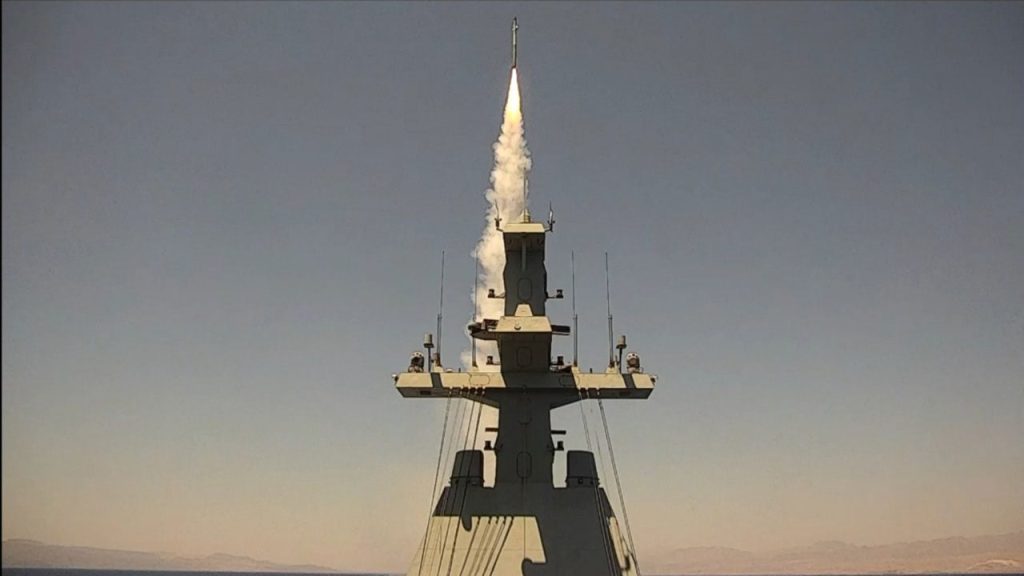In a significant escalation in military capabilities, Israel has activated its state-of-the-art aerial defense system, “Barak Magen,” for the first time. During this deployment, the Israeli Navy successfully intercepted multiple Iranian drones, showcasing the system’s advanced capabilities. This move comes amid ongoing tensions between Israel and Iran, as both nations have exchanged missile strikes in a rapidly intensifying conflict.
| Article Subheadings |
|---|
| 1) Overview of the Barak Magen System |
| 2) Strategic Importance of the Interception |
| 3) Escalating Tensions Between Israel and Iran |
| 4) Historical Context of the Conflict |
| 5) Implications for Regional Security |
Overview of the Barak Magen System
The “Barak Magen,” meaning “lightning shield,” represents Israel’s latest advancement in aerial defense technology. Officially introduced by the Israel Defense Forces (IDF), this system has been designed to intercept a diverse range of aerial threats, including drones, cruise missiles, and shore-to-sea missiles. It operates through a long-range air defense interceptor launched from naval vessels, specifically from the Israeli Navy’s Sa’ar 6 missile ships.
On Sunday night, the Barak Magen was put to use for the first time, successfully intercepting and destroying multiple Iranian drones. According to the IDF, such a prompt operational capability reflects the system’s reliability and effectiveness against real-world threats, enhancing Israel’s naval defense architecture. Experts, including senior military analysts, note that the Barak Magen adds a new layer to an already advanced multi-tiered missile defense system in Israel.
Strategic Importance of the Interception
The interception of the Iranian drones is seen as a strategic victory for Israel, particularly given the context of ongoing hostilities with Iran. Analysts emphasize that the Barak Magen not only provides immediate force protection for the Israeli Navy but also extends defense capabilities to Israel’s critical oil and gas infrastructure in the eastern Mediterranean. This geographic positioning allows for long-range interceptions that offer significant strategic depth.
Analyst John Hannah, a senior fellow specializing in national security, highlighted the advantages the Barak Magen brings to Israel’s military architecture. “It allows Israel to conduct interceptions at significant distances from the Israeli homeland, both in the eastern Mediterranean and the Red Sea, thereby enhancing its defensive posture,” he stated.
Escalating Tensions Between Israel and Iran
Tensions between Israel and Iran are at an all-time high, with recent missile strikes marking a significant escalation in hostilities. Over the past few days, Israel and Iran exchanged numerous strikes, with Iran reportedly launching a new wave of missile attacks that have resulted in casualties. As per reports, at least eight individuals have been killed, and dozens more have sustained injuries.
The ongoing conflict has prompted the Israeli military to assert control over airspace in Tehran, issuing evacuation warnings to approximately 330,000 residents in a central area of the Iranian capital. This rapid escalation raises concerns regarding the potential for further military confrontation as both nations continue to demonstrate their operational capabilities through aggressive posturing and actual military action.
Historical Context of the Conflict
Understanding the current situation necessitates a look back at the history of the Israel-Iran conflict, rooted in mutual animosity and strategic rivalry. Following the Islamic Revolution in Iran in 1979, ties between the two nations deteriorated sharply, with Iran positioned as a staunch adversary of Israel’s existence. Over the years, their rivalry has manifested through proxy conflicts, military engagements, and an ongoing war of words.
More recently, Iran’s nuclear ambitions have exacerbated tensions, drawing ire from Israel and prompting military preparations. Israel, perceiving a nuclear-armed Iran as an existential threat, has implemented various strategies to curtail Iran’s military capabilities, from cyber operations to preemptive airstrikes on Iranian positions.
Implications for Regional Security
The operational success of the Barak Magen system holds significant implications for regional security dynamics in the Middle East. Many experts posit that Israel’s proactive measures may act as a deterrent to Iranian aggression, especially in terms of aerial and missile threats. However, this also raises the stakes for potential retaliatory actions by Iran, which may feel compelled to respond to perceived losses in military assets.
The introduction of the Barak Magen could also influence neighboring countries’ military strategies and alliances. States within proximity may reassess their own defense postures and seek to enhance their military capabilities in response to both Israeli advancements and Iranian threats.
| No. | Key Points |
|---|---|
| 1 | Israel’s Barak Magen aerial defense system has been activated for the first time. |
| 2 | The system successfully intercepted Iranian drones launched at Israel. |
| 3 | Tensions between Israel and Iran have escalated with recent missile exchanges. |
| 4 | Analysts claim the new system enhances Israel’s defense of its critical infrastructure. |
| 5 | The current conflict may reshape military strategies in the region. |
Summary
The activation of the Barak Magen aerial defense system marks a pivotal moment in Israel’s military strategy, enhancing its capability to defend against threats from Iran. As tensions escalate, the implications of this technology not only affect Israel but also have far-reaching consequences for regional security dynamics. Moving forward, continued vigilance and proactive measures will likely define how both nations engage in this ongoing conflict.
Frequently Asked Questions
Question: What is the purpose of the Barak Magen system?
The Barak Magen system is designed to intercept a variety of aerial threats, including drones and missiles, providing enhanced defense for Israel’s naval and critical infrastructure.
Question: How has the Israel-Iran conflict evolved recently?
The conflict has escalated over recent days with missile exchanges, resulting in casualties. The situation raises concerns about military engagement between both nations.
Question: What impact does the Barak Magen have on regional security?
The introduction of this defense system may deter Iranian aggression while possibly prompting neighboring countries to reconsider their military strategies in response to the evolving threats.


